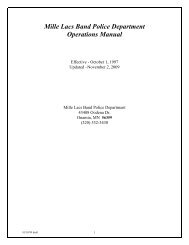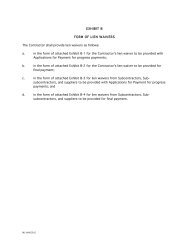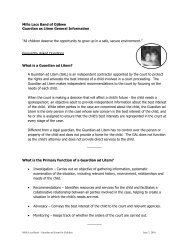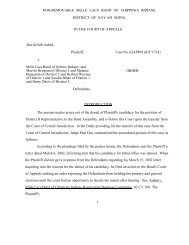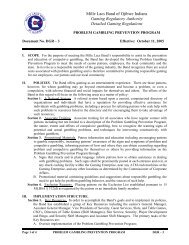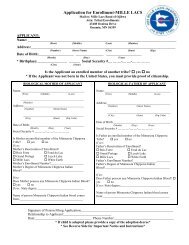Representing Yourself - Mille Lacs Band of Ojibwe
Representing Yourself - Mille Lacs Band of Ojibwe
Representing Yourself - Mille Lacs Band of Ojibwe
Create successful ePaper yourself
Turn your PDF publications into a flip-book with our unique Google optimized e-Paper software.
well as any other issues that may arise. Even a seemingly simple case can demand a lot <strong>of</strong> your time and<br />
attention.<br />
Keep your contact information with the Court current so that Court notices and orders will reach you.<br />
STEP 3<br />
In the Courtroom<br />
Make a good impression and dress appropriately. Arrive on time with all your materials.<br />
Respect the Court. Stand when the Judge enters or leaves the Courtroom and when you speak to the<br />
Judge. 1 During the hearing, you should listen carefully, ask permission <strong>of</strong> the Judge to speak, talk directly<br />
to the Judge and not the opposing party. When you speak to the Judge, start by saying “Your Honor”.<br />
Speak loudly and clearly. Never interrupt the other side or the Judge when speaking. Remember that<br />
only one person can speak at a time.<br />
Respect the opposing party and do not argue with the opposing party in front <strong>of</strong> the Judge. Use<br />
respectful terms <strong>of</strong> address.<br />
BE PREPARED. This may be the only chance you will have to present your case. Make sure all evidence<br />
is prepared. Make sure all witnesses are present in the Courtroom and available to testify. The better<br />
prepared you are, the better the case will go.<br />
Before you leave the Courtroom, make sure you understand what happens next:<br />
<br />
<br />
<br />
<br />
<br />
Do you need to come back for another hearing?<br />
Do you need to prepare a written argument?<br />
Do you need to take other steps or actions?<br />
Will the Judge issue an order?<br />
Politely ask questions if you do not understand what will happen next.<br />
The Role <strong>of</strong> the Judge<br />
Your case will be heard and decided by a Judge or a Special Magistrate. Keep in mind that the role <strong>of</strong><br />
the Judge is to be an impartial referee in the dispute between you and the opposing party.<br />
The Judge may not help you present your case. Helping you, by pointing out mistakes or telling you<br />
what to do next, would be unfair to the opposing party. When you decide to represent yourself, you<br />
take on the full responsibility <strong>of</strong> presenting your case.<br />
The Judge may not speak with you about your case when the opposing party is not present. This is true<br />
even if the issue you want to speak with the Judge about seems like a simple procedural issue. Such<br />
communication would be unfair to the opposing party.<br />
The Judge will decide the case based on the facts presented in Court and the applicable law. The Judge<br />
may only consider the facts as presented in Court, through evidence and testimony. You need to make<br />
sure that all facts supporting your case are properly presented. The Judge also must follow the laws that<br />
apply. Sometimes the law dictates which facts the Judge may and may not consider. You need to make<br />
sure that you present the facts that the law requires or permits.<br />
1 Judge Richard Osburn does not require persons in the Courtroom to stand when he enters or leaves. Other<br />
Judges <strong>of</strong> the Court <strong>of</strong> Central Jurisdiction may require this. The bailiff or Court clerk will announce “all rise” if you<br />
are required to stand.<br />
3



